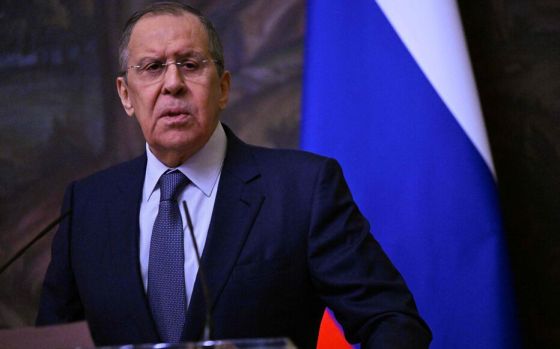Physical Address
Indirizzo: Via Mario Greco 60, Buttigliera Alta, 10090, Torino, Italy
Physical Address
Indirizzo: Via Mario Greco 60, Buttigliera Alta, 10090, Torino, Italy



Russian Foreign Minister Sergei Lavrov attends a joint press conference with International Committee of the Red Cross (ICRC) President following their talks in Moscow on March 24, 2022. (Photo by Kirill KUDRYAVTSEV / POOL / AFP)
Sergei Lavrov dots the i’s. He provides the necessary clarification to the detractors of the Russian Federation and opposes the truths that contradict the entire Western narrative about Ukraine.
Debunking the pro-Ukrainian discourse held by the Atlanticist powers and those of the integral West, the head of Russian diplomacy explains that this discourse is based on the Russophobic postulate to establish a pseudo-pro-Ukrainian argument.
Everyone remembers the hysterical wave that followed the start of the Russian special operation in Ukraine. Monuments of universal culture have been thrown out the window for the simple reason that they are Russian. Thus, Lavrov explains, “Western strategy was based on the principle of total isolation of Russia. Most of the actions taken by the West since the start of the Russian special military operation have been developed in the spirit of an ultimatum issued to Moscow on all axes, including with regard to the settlement of the conflict in Ukraine.
This Western anti-Russian superiority complex contributed to the blocking of all attempts at mediation in the conflict, notably that of the Turks. Even the plan initially presented by Zelensky a few days after the Russian special operation began on February 24, 2022, was blocked and refused by the then British Prime Minister Boris Johnson. This shows the great freedom that Westerners have taken in their treatment of the Ukrainian side, considering it subservient to the orders of the integral West.
Returning to Russia’s good faith in the Ukrainian issue, Sergei Lavrov clarified that Moscow is not conducting “clandestine negotiations” with anyone On the situation in Ukraine, it is the West that refuses to organize talks on an equitable basis. Worse, the head of Russian diplomacy recalled that “if the agreement of February 20, 2014 had been implemented and a government of national unity had been created, Ukraine would have found itself within the borders of 1991.”
This is why “the Vladimir Putin’s peace proposals “are the result of a sober and constructive analysis of the current situation,” Lavrov hammered home, dismissing attempts at sponsorship by President Zelensky, whose mandate legally ended several weeks ago but who refuses to organize presidential elections. Returning to the so-called Bürgenstock peace conference in Switzerland on June 15 and 16, the Russian Minister of Foreign Affairs considered that the ultimate goal was not to mark out the paths to peace, but above all to “take a family photo with as many people as possible posing.”
And undermining the Western superiority complex, Sergei Lavrov made a point of reminding us that Moscow is not desperate to beg for a minimum peace or an armistice with kyiv and its Atlanticist sponsors, quite the contrary. “If anyone thinks that when we are invited to the second session, we will immediately run there, they are wrong. We are ready to speak only on an equal footing,” he clarified. Here, the remarks are aimed rather at the zealous people of Europe and the United States who intend to make Ukraine win the war down to the last Ukrainian.
And as if to further clarify his idea, the head of Russian diplomacy added: “if, at some point, our Western neighbors reconsider their dead-end policy, we will be ready to listen to them.” In short, stop arming a dying state and stop pushing it to commit acts of terrorism on Russian soil, and then dialogue will be possible. In other words, it is the entire West that refuses dialogue by resorting to actions bordering on terrorism.
This is why Russia offers two options to Belarus and all its neighbors. At the initiative of the Russia-Belarus Union, Moscow specifies through Lavrov that “Russian tactical nuclear weapons deployed in Belarus are a sure way to protect the Western borders” of this space under construction. Also, the Russians intend to launch an “initiative on the Eurasian security system”. This concerns, according to Lavrov, “all countries of the continent that wish to study the prospects of a fair system without any external interference and without listening to voices from across the Atlantic.”
It is precisely this architecture that interests Russians more. Moreover, in terms of economic exchanges, 92% of payments with Belarus are made in national currencies, 90% with China and more than half with India, recalls Sergei Lavrov. It is therefore a Russia resolutely turned towards the future which is making its mark and which is telling an integral West suffering from strategic blindness that peace is a path which comes through dialogue and not through weapons and sanctions.